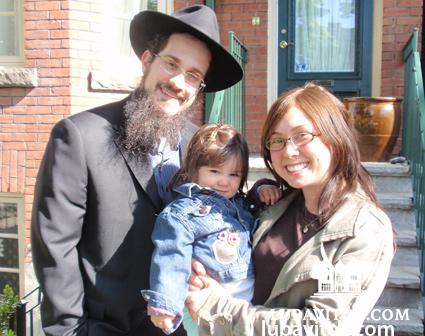The 15th of Av corresponds this year to Wednesday, August 15th. Of this date on the Jewish calendar, the Mishna says, “There were no holidays so joyous for the Jewish People as the Fifteenth of Av and Yom HaKippurim, for on those days, daughters of Jerusalem would go out dressed in borrowed white dresses.
"And the daughters of Jerusalem would go out and dance in the vineyards located on the outskirts of the city. And everyone who didn't have a wife would go there."
In honor of this day dedicated to women and marriage, lubavitch.com brings its readers the story of Yishaya and Shira Ros.
Yishaya and Shira met each other as students during a Shabbat dinner at the Chabad House at New York University in 2004. They went their separate ways, each delving into advanced Jewish studies at yeshivas and seminaries in Israel and the U.S. The two met up again, and were married in 2006.
Rabbi Yishaya and Shira Rose reveal how they went from Hollywood and Broadway to a life serving the 5000 or so Jewish students at University of Toronto and Ryerson University.
Shira Rose, 23, is the only daughter of Steve Wasserman and Jessica Klein Levenbrown, the television writer-producer team that developed hits such as the original Beverly Hills 90210. Her path to Chabad life began with an unthinkable tragedy.
Your father died in a boating accident near Catalina Island, off the coast of southern California, when you were just twelve. How did you cope?
Growing up, I went to temple, and definitely identified as a Jew, but I did not know much about it. My commitment to God was to say Shema before bed, and in return He wasn’t supposed to let anyone die. After my father died, I started struggling with the idea of God, because He had broken my deal. I put God away.
What changed your relationship with Judaism?
After 9-11 happened, I decided I wanted to help change lives, make lives better. I still didn’t know if I believed in God but I wanted to help people every day so I decided to become a rabbi.
You started college at NYU. That campus is known for its Jewish student body, and the availability of kosher food. Did that draw you to enroll there?
I started keeping Shabbos my first week at NYU. But I was miserable. I couldn’t call my mother, no email. I felt disconnected from everything and everyone. Then I met Chabad of NYU’s rabbi Rabbi Dov Yona Korn and the Korn family. I fell in love with them and their Chabad house. So I started learning with Sara Korn, and I went on Birthright Israel that winter with Rabbi Korn. When I came back from Israel, I started eating kosher.
Did the Korns play matchmaker too?
My first Shabbos in residence at NYU was the first Shabbos I observed. As it happened, that Friday night at Chabad I met the man who would later become my husband. I started speaking more intensely with him after Birthright. He came back from a study break at Morristown (NJ – home of Chabad-Lubavitch’s Rabbinical College of America) with a beard, and I came back from Israel wearing skirts. We were each other’s support through this major change.
What happened to your rabbinical dreams?
By the time I got to college I was already past the rabbi idea, but as soon as I heard of it, being a Chabad rebbetzin, especially on campus, sounded great. I think it is the greatest thing ever to live an authentic Jewish lifestyle and be in a position to share it with other people all the time, to be a light in the darkness.
How did your mother react to your new life path?
When I was becoming more involved with Chabad, my mom could not understand what was happening to me. She decided she would figure out what the story was. She went to her local Chabad center in Los Feliz, CA, and met Rabbi Leibel and Devonye Korf, and loved it. She now is going on speaking engagements at Chabad centers all over. She is a Chabad celebrity now.
Rabbi Rose, how does an aspiring director – already taking classes at the prestigious Tisch School of the Arts at NYU – turn into a Chabad on Campus rabbi?
My parents started me on Shakespeare at age five. They always took me to serious theater. I never looked at theater as entertainment. We would go to see a play and then delve into what it meant, and what it taught us. Theater was a way to change and affect people.
But as you grew in your connection with Judaism, spending your senior high school year at a Jewish day school, and meeting Rabbi Korn at NYU, did you see a conflict between your drama dreams and an observant lifestyle?
A director helps people work on their character, come to terms with imaginary person. Now I’ve changed my medium, but not my goal. I help people come to terms with their souls, and the stage isn't fake anymore.
What has your theater training taught you about being a campus rabbi?
A good theater director allows people to explore their own creative identities. Even if a director knows the right answer, he has to let an actor come to their answer on their own, and not overwhelm them with all the “right” ideas.
Theater asked questions, but gave no answers. The answers were at Chabad. The time has come for me to give to others what Chabad has given to me.
With a grant from the Rohr Campus Initiative, the Roses are already hard at work with the help of two-year-old Shayna Leah, getting to know students on campus. The first event they host will be a welcome back BBQ at their center, steps away from the University of Toronto campus, this fall.

Be the first to write a comment.